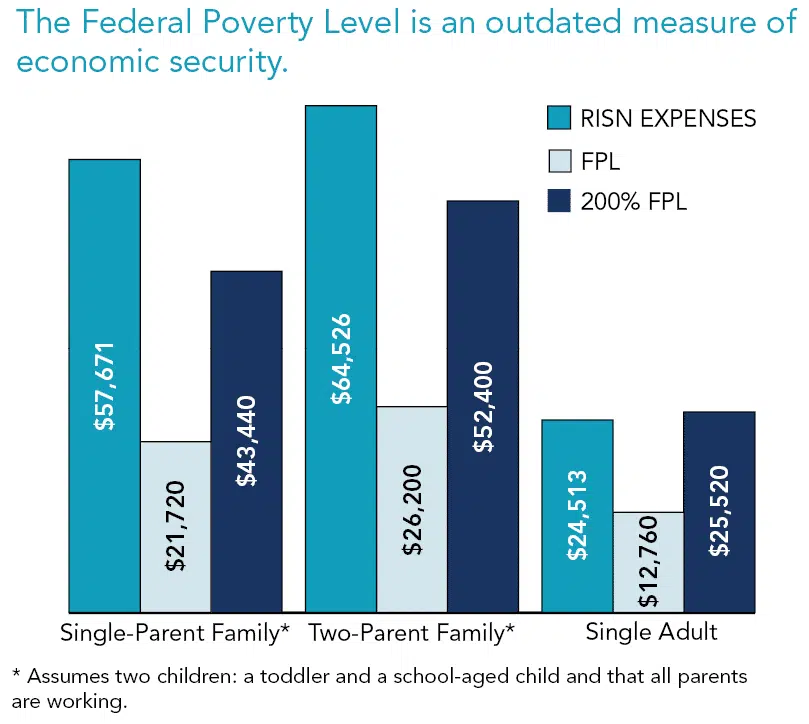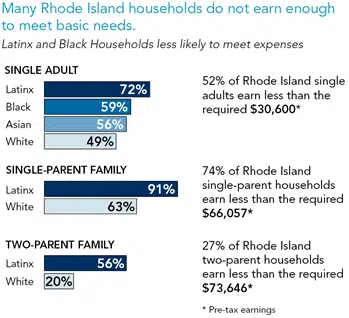Treat essential workers as essential
By Economic Progress Institute in UpriseRI
It also highlights how federal and state work supports help Rhode Islanders meet the costs of basic needs. This year’s report also looks at racial and ethnic disparities in the ability of Rhode Islanders to meet basic needs and how additional government support has helped essential and other workers and their families during the COVID-19 pandemic.
The findings of this report show that Black and Latinx Rhode Islanders are less likely to be able to meet expenses.
“We know it is expensive to live in Rhode Island and many individuals do not have the necessary income to meet their basic needs” said Rachel Flum, executive director of the Economic Progress Institute.
“This year we wanted to show the realities that COVID has brought to light – that many of the workers who are essential to our economy aren’t paid enough to meet their own basic needs. We also wanted to highlight that while many workers struggle to keep up with their bills, Black and Latinx workers are faring far worse than White workers. Targeted interventions are needed to turn this trend around.”
Policies that address the economic insecurity of low-income and middle-income families and individuals will help to decrease these disparities. Case examples in the RISN show how child care assistance, health insurance subsidies, and SNAP benefits can help a parent earning a bit above poverty make ends meet, while there is a gap for a family with earnings closer to two and a half times the poverty level due, in large measure, to ineligibility for these programs. The lack of affordable housing also contributes to challenges in balancing families’ budgets.
The Federal Poverty Level (FPL) is often used as the measure of economic security. But the FPL, designed in the 1960s was based on the cost of food, then the largest household expense. Now, housing and child care costs take up a larger share of family’s budgets. The FPL also does not consider how work support programs help families meet certain expenses. The RISN takes all these variables into account to give a more accurate picture of economic security.
Many workers identified as ‘essential’ during the pandemic are lower-wage workers, among whom Latinx and Black workers are over represented. These include child care and direct care workers, cleaning staff in hospitals and other public places, delivery drivers, stock clerks, and cashiers at grocery stores.
Finally, the RISN offers a picture of how the federal CARES Act and additional government support eased financial stress for low- and moderate-income families, many of whose wage earners were laid off or lost their jobs during the pandemic. The additional unemployment benefits and SNAP benefits in 2020 aided not only unemployed families but the Rhode Island economy as well. More money in their pockets meant more local spending, to the benefit of local businesses.
The pandemic has highlighted the disparities in wages, wealth, and health that Black and Latinx Rhode Islanders have experienced for far too long in our society as a result of historic and current racism. Increasing the minimum wage, expanding eligibility for child care and health care assistance, increasing SNAP benefits, and investing in affordable housing are among the race-forward policies that would help decrease disparities and promote economic security for Rhode Islanders. The full report and infographic can be found here.
–
formerly The Poverty Institute – is a nonpartisan research and policy
organization dedicated to improving the economic well-being of low- and
modest-income Rhode Islanders. The Economic Progress Institute advocates for
policies that improve economic security and opportunity for Rhode Islanders.
Can you help us?
Funding for UpriseRI reporting relies on the generosity of readers like you. Our independence allows us to write stories that hold RI state and local government officials accountable. All of our stories are free and available to everyone. But your support is essential to keeping Steve and Will on the beat, covering the costs of reporting many stories in a single day. If you are able to, please support Uprise RI. Every contribution, big or small is so valuable to us. You provide the motivation and financial support to keep doing what we do. Thank you.


